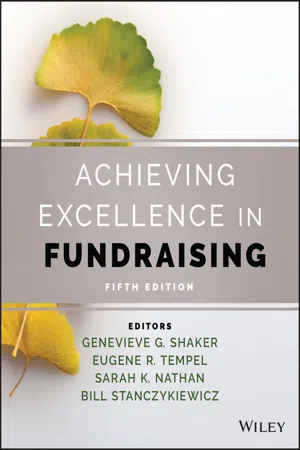
Achieving Excellence in Fundraising
- English
- ePUB (mobile friendly)
- Available on iOS & Android
Achieving Excellence in Fundraising
About this book
Strategies and concepts for mission-based fundraising
From the world's first school of philanthropy, Achieving Excellence in Fundraising is the leading fundraising textbook based on research and steeped in practical expertise. It has long been the go-to reference for fundraising principles, concepts, and techniques. Topics include donor motivations and behaviors, engaging donors at all levels, inclusive and ethical fundraising, and more, with contributions from noted experts in the field. You'll gain insight into the practice of fundraising and the fundraising cycle, reinforced by discussion questions, application exercises, and research-based recommendations.
This 5th edition of Achieving Excellence in Fundraising is reimagined to meet the needs of today's fundraisers, their nonprofit employers, and the causes they serve, while maintaining key concepts that stand the test of time. Compelling and timely topics new to this edition include donor-advised funds, crowdfunding, raising money in challenging times, fundraising for social advocacy, and more. The needs of fundraising educators are also a central consideration in the book's organization and contents. Discover why Achieving Excellence in Fundraising is the leading textbook and reference in the field!
- Learn the key principles and techniques of philanthropic fundraising, from the experts at the Indiana University Lilly Family School of Philanthropy
- Consider today's most pressing issues in fundraising—using research and data to inform practice, engaging a diversity of donors, expressing gratitude effectively, and much more
- Utilize research-based fundraising strategies to enhance the success of your organization's efforts and to achieve your professional goals
Chapters are written by faculty, alumni, and associates of the prestigious Lilly Family School of Philanthropy. The newest edition of this trusted work is an essential source of information for anyone in the fundraising space.
Frequently asked questions
- Essential is ideal for learners and professionals who enjoy exploring a wide range of subjects. Access the Essential Library with 800,000+ trusted titles and best-sellers across business, personal growth, and the humanities. Includes unlimited reading time and Standard Read Aloud voice.
- Complete: Perfect for advanced learners and researchers needing full, unrestricted access. Unlock 1.4M+ books across hundreds of subjects, including academic and specialized titles. The Complete Plan also includes advanced features like Premium Read Aloud and Research Assistant.
Please note we cannot support devices running on iOS 13 and Android 7 or earlier. Learn more about using the app.
Information

PART ONE
PHILANTHROPIC CONCEPTS FOR FUNDRAISING

CHAPTER ONE
DEVELOPING A PERSONAL PHILOSOPHY OF FUNDRAISING
- Understand the importance of developing a personal philosophy of fundraising.
- Examine personal and professional experiences in relation to who they are as fundraisers.
- Consider societal factors relevant to their philosophy, including the roles of philanthropy.
- Reflect on organizational conditions influencing their philosophy, including foundational principles of fundraising as professional work.
- Reflect on examples from the authors' philosophies.
Why a Philosophy of Fundraising?
Personal Experiences and Philanthropy
The Philanthropic Autobiography
Philanthropy in Society
- Through healthcare, human services, and international relief, nonprofit organizations seek to reduce human suffering for those who are injured or ill, to aid victims, and to assis...
Table of contents
- COVER
- TABLE OF CONTENTS
- TITLE PAGE
- COPYRIGHT
- LIST OF TABLES, FIGURES, AND EXHIBITS
- FOREWORD
- PREFACE
- ACKNOWLEDGMENTS
- THE EDITORS
- AUTHOR BIOS
- PART ONE: PHILANTHROPIC CONCEPTS FOR FUNDRAISING
- PART TWO: CONTEMPORARY DYNAMICS OF FUNDRAISING
- PART THREE: AN ORGANIZATIONAL FOUNDATION FOR FUNDRAISING
- PART FOUR: THE FUNDRAISING TEAM
- PART FIVE: BUILDING AND SUPPORTING THE DONOR BASE
- PART SIX: ENGAGING THE DIVERSITY OF INDIVIDUAL DONORS
- PART SEVEN: PART SEVENSTRATEGIES FOR MAJOR DONORS AND INSTITUTIONAL FUNDERS
- REFERENCES
- INDEX
- END USER LICENSE AGREEMENT